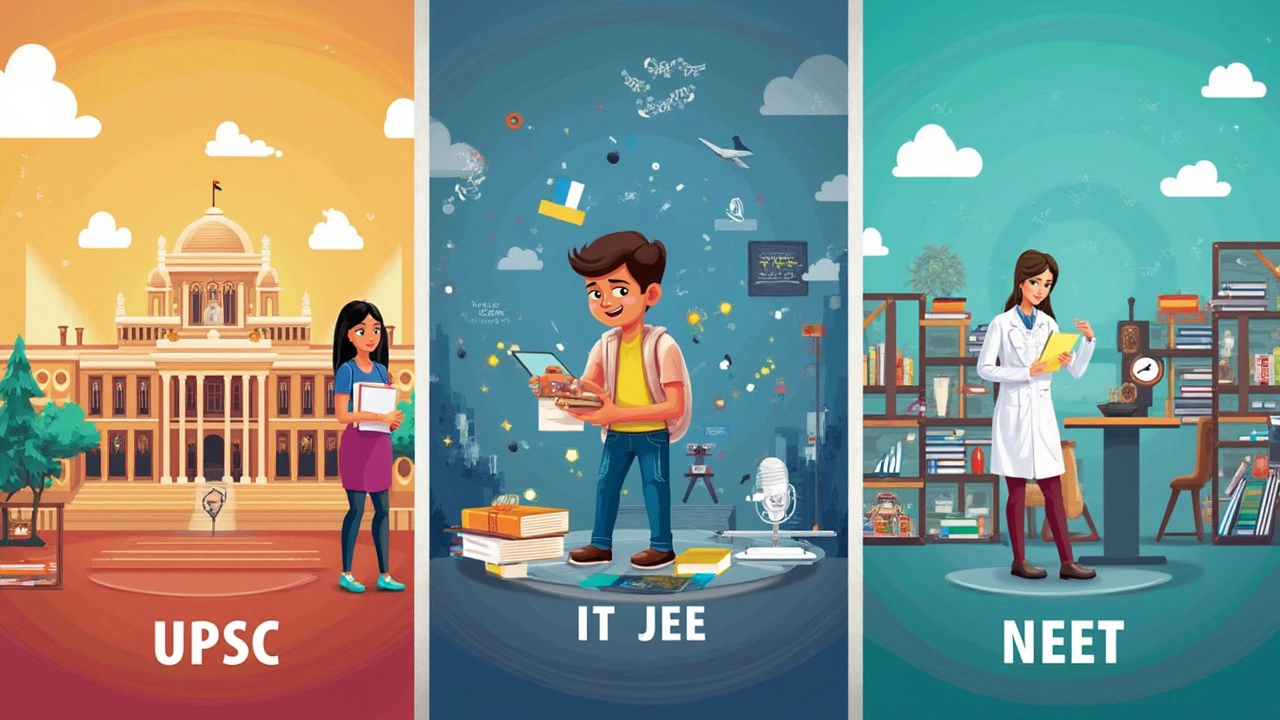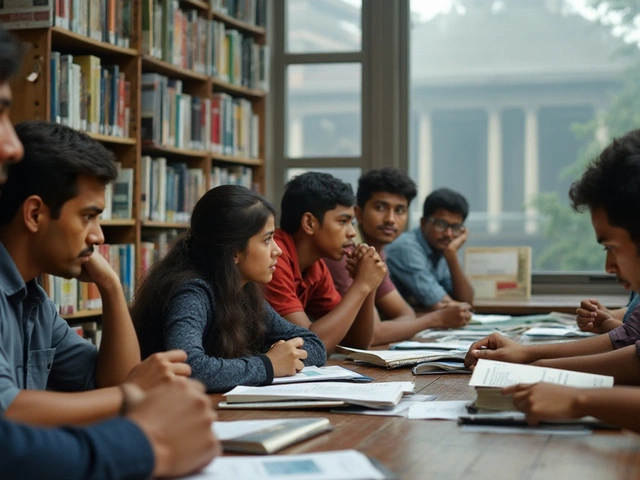Cracking the toughest exams in India isn't just about studying hard. It's a full-blown obsession for lakhs of students, turning homes into mini-libraries, friendships into question-answer sessions, and every meal into a quick break from revision. Year after year, these exams shatter dreams while making a lucky few into overnight legends. Some say the stress is worse than running a marathon barefoot on gravel. Others quietly whisper about all-nighters, caffeine addictions, and that one syllabus topic at 3 AM that just won’t stick. The real kicker? For every one student who's selected, more than a hundred walk away wondering what went wrong. We’re here for an honest, unfiltered look at what really makes these three notorious tests—the UPSC, IIT JEE, and NEET—the monsters they are in the world of education.
UPSC Civil Services Examination: The Everest of Indian Competitive Exams
If you thought school or college exams were tough, the UPSC Civil Services Examination would tell you to sit down and take notes. Each year, over 10 lakh (one million) hopefuls sign up for what many call India’s most unforgiving written exam, all gunning for less than a thousand seats in the country’s most powerful services—IAS, IPS, IFS. Think you can outsmart some of the brightest minds in the nation? You’ll need more than facts; you’ll need stamina, critical thinking, and the ability to write essays faster than you text your friends.
The UPSC exam isn’t just a test; it’s a year-long mental grind. Start with the Prelims, where two papers weed out the majority with questions as unpredictable as Indian monsoons. Survive that, and you land in the Mains: nine papers in five days, including one where you pour your heart into essays hoping an examiner relates. Then, if you still have your wits, comes the Interview—or, as many call it, the Personality Test. A panel of seasoned bureaucrats grills you about everything from government schemes to why you think pineapple belongs (or doesn’t!) on pizza.
Here’s what makes UPSC a whole new beast:
- Vast Syllabus: The syllabus stretches across Indian history, geography, economics, ethics, and current affairs, including the fine print from monthly government reports.
- Unpredictable Questions: The paper setters have a reputation for picking out-of-the-box questions. Don’t be shocked if they skip the usual trends.
- Cut-throat Competition: In 2024, over 12 lakh applied, but only 1,000 made the final cut. The odds are steep.
- Long Preparation Time: Many aspirants take two or three years to get in shape for this marathon.
Check out the selection stats for 2024:
| Applicants | Appeared | Selections | Success Rate |
|---|---|---|---|
| 12,00,000+ | 5,53,598 | 1,016 | 0.19% |
A few survival tips? Don’t try to memorize everything. Focus on understanding concepts. Stay updated with reliable news sources. Practice writing—loads. And please, start taking breaks. Burnout is real and many give up because they keep running with no pause button. Remember, you’re not competing against others, you’re battling your own limits.

IIT JEE: The Ultimate Test for Engineering Aspirants
The Indian Institutes of Technology Joint Entrance Examination, or simply IIT JEE, is like the World Cup for math and science nerds. Ask anyone who's been through the grind—they recall nights spent wrestling with calculus, getting stuck in physics problems, and staring at chemical equations until the numbers started dancing. For most, making it into the elite IITs means instant bragging rights and a free pass to some of the world’s top recruiters. But there’s a dark side—stories of 15-hour study days, sacrificed vacations, and dreams measured in AIRs (All India Ranks).
The JEE journey starts with the Mains exam, a tough nut by itself, attempted by over 10 lakh students annually. If you’re among the top 2 lakh scorers, you’re up for the Advanced stage. Now it’s like switching from regular chess to speed chess, with the complexity dialled up to eleven. The questions are not just about formulas; they test if you can twist and bend concepts in new, mind-boggling ways. In 2024, about 180,000 students qualified for JEE Advanced, but only around 17,000 secured an IIT seat.
Here's why this exam is such an uphill battle:
- Depth of Syllabus: Think of school textbooks, then double the depth.
- High Pressure: Everyone chases an AIR; a difference of a few marks can throw you from top 100 to top 1000.
- Time Management: You've got 3 hours to crack questions that could easily stretch out to 5 or 6 per chapter if you took it easy.
- Intense Peer Competition: Coaching towns like Kota and Hyderabad? They're full of kids as ambitious (and stressed) as you are.
Take a look at JEE Advanced stats from 2024:
| Appeared | Qualified | Selected for IITs | Success Rate (%) |
|---|---|---|---|
| 1,80,226 | 48,890 | 17,385 | 9.6% |
Want to survive the JEE jungle? Ditch rote learning. Build a strong base in concepts and practice problem-solving daily. Use mock tests to your advantage—they'll teach you time management and help you spot weak areas before it’s too late. Don’t ignore physical and mental health: a healthy body helps a sharper mind. Even toppers admit that group studies help generate fresh ideas and, honestly, lighten the mood. Whether or not you nail the exam, the sheer grind will make you bulletproof for life.

NEET: The Battleground for Aspiring Doctors
India’s National Eligibility cum Entrance Test, or NEET, is where future doctors prove their mettle. If battling biology diagrams, chemical reactions, and endless mock test papers sounds thrilling, this exam won’t disappoint. Nearly 24 lakh candidates went all-in for NEET 2024, scrambling for just about 1 lakh MBBS seats across the country. The math? Only about 4% get the golden ticket. The rest? Dreams put on hold or redirected to BDS and alternative courses.
What turns NEET into a hair-raising race?
- Vast and Dynamic Syllabus: It pulls in all the twists from NCERTs, especially in biology, chemistry, and physics.
- Time Crunch: 180 questions in 200 minutes. You can’t afford to dawdle.
- Negative Marking: Get a question wrong, and it’s not just zero—it’s minus one. Precision gets rewarded.
- Lakhs of Aspirants: The sheer volume of competitors multiplies the pressure.
Check the latest NEET 2024 figures:
| Registered | Appeared | Qualified | Seats Available | Selection Rate |
|---|---|---|---|---|
| 24,00,000+ | 22,80,000 | 12,09,000 | 1,08,390 | ~4.5% |
How to not get lost in the NEET storm? Stick to NCERT books—don’t jump into random guidebooks unless you’ve mastered the basics. Time your practice sessions; speed is just as crucial as accuracy. Make revision sheets with diagrams and shortcuts—these last-minute memory joggers work wonders. Join a peer group or study circle: explaining tricky concepts to friends is a brilliant way to fix them in your head. And yep, don’t forget the human body you’re aiming to heal—eat well, move a bit, and sleep enough.
Every year, these exams rewrite stories—sometimes with euphoria, sometimes heartbreak. Yet, ask anyone who gives it their all, and they'll say it's never just about the result. The challenge changes you. It chisels out discipline, grit, and a perspective that sticks, whether you wear the badge of a civil servant, drape the white coat, or code away in an IIT dorm. These are more than entrance tests—they’re life tests in disguise. And if you’re bracing for one of them, know this: you’re already tougher than you think.



